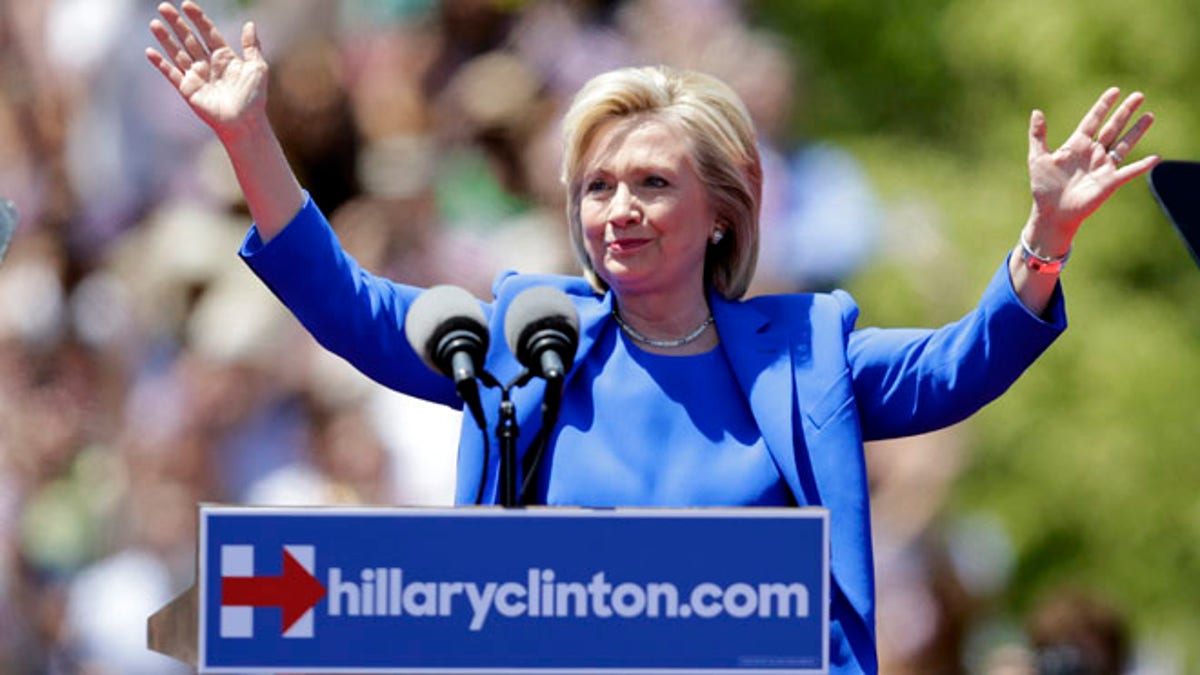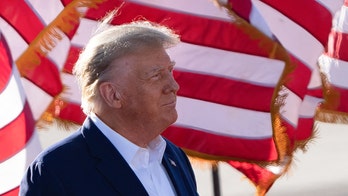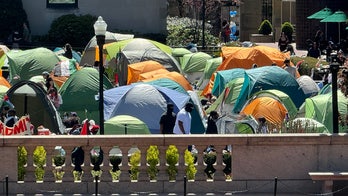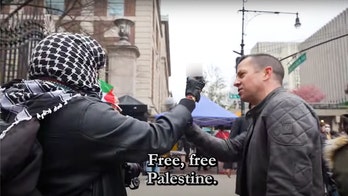
Saturday, June 13, 2015: Hillary Clinton, on Roosevelt Island, speaking at her formal presidential campaign launch, New York, N.Y. (AP)
Hillary Clinton on Saturday officially launched her 2016 presidential campaign, calling for a return to shared prosperity and asking American workers, students and others to trust her to fight for them.
Clinton made the announcement at an outdoor rally on New York City's Roosevelt Island, two months after announcing her campaign with an online video.
“You have to wonder: When do I get ahead? I say now,” Clinton told the crowd in a roughly 46-minute speech. “You brought the country back. Now it’s your time to enjoy the prosperity. That is why I’m running for president of the United States.”
The former first lady, U.S. senator from New York and secretary of state is the Democratic frontrunner in the 2016 White House race.
Also in the race are Sen. Bernie Sanders, of Vermont, former Maryland Gov. Martin O'Malley and former Rhode Island Gov. Lincoln Chaffe.
She lost her 2008 bid for the Democratic presidential nomination to then-Sen. Obama.
Clinton, wearing her signature blue pantsuit, walked through the crowd en route to the stage for her speech.
She remarked that Franklin D. Roosevelt’s Four Freedoms are a “testament to our nation’s unmatched aspirations and a reminder of our unfinished work at home and abroad.”
Clinton also drew into focus what will likely be the key themes of her campaign including support for same-sex marriage, wage equality for women and all Americans, affordable college tuition and free child-care and pre-kindergarten.
“The top-25 hedge fund managers make more than all kindergarten teachers combined,” she said. “And they’re paying lower taxes.”
Clinton attempted to portray herself as a fierce advocate for those left behind in the post-recession economy, detailing a lifetime of work on behalf of struggling families. She said her mother's difficult childhood inspired what she considers a calling.
"I have been called many things by many people,” Clinton said.” Quitter is not one of them."
She said that attribute came from her late mother, Dorothy Rodham, in whom she would confide after hard days in the Senate and at the State Department.
"I wish my mother could have been with us longer," Clinton said. "I wish she could have seen the America we are going to build together ... where we don't leave any one out or any one behind."
Clinton was joined by her husband, former President Bill Clinton, and their daughter, Chelsea.
She also was critical in her speech of Republicans, suggesting they have reserved economic prosperity for the wealthy, in large part by cutting taxes for the country’s highest wage-earners.
She also accused them of trying to “wipe out tough rules on Wall Street,” take away health insurance from more than 16 million Americans without offering any “credible alternative” and turning their backs on “gay people who love each other.”
The Republican National Committee said in response that Clinton's campaign was full of hypocritical attacks, partisan rhetoric and ideas from the past.
"Next year, Americans will reject the failed policies of the past and elect a Republican president,” RNC Press Secretary Allison Moore said.
Republicans also argued Clinton devoted only about five minutes of her speech to foreign policy.
Clinton now heads to four early-primary states, starting Saturday night in Iowa where she will talk with volunteers and others about grassroots-campaign efforts for the first-in-the-nation caucus state.
The organizational meeting will be simulcast to Clinton camps across the country and serve as a blueprint for them all 435 congressional districts.
She then travels to New Hampshire on June 15, South Carolina on June 17 and in Nevada on June 18.
Clinton vowed Saturday to roll out specific policy proposals in the coming weeks, including ones on rewriting the tax code and sustainable energy.
In what was her first major speech of her campaign, she also cited President Obama, Roosevelt and her husband, saying they embraced the idea that "real and lasting prosperity must be built by all and shared by all."
Holding the event on an island between Queens and Manhattan raised some criticism about its accessibility by vehicle and public transportation.
The campaign estimated the event crowd, whose members needed a ticket, at 5,500. However, the number appeared smaller, and the overflow section was empty.
The Associated Press contributed to this report.




